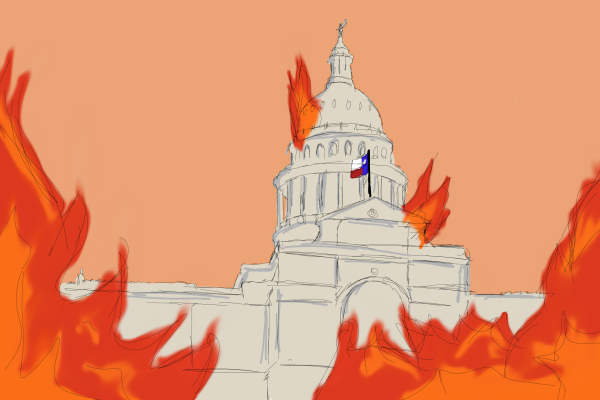Recent IPCC reports highlight the need for change in the face of performative activism
Climate change is no longer an issue easily ignored. What was once a looming threat for future generations has become an almost tangible tension that’s risen significantly in the past few years. It’s becoming clear that climate change will be something younger generations like ours are forced to reckon with within our lifetimes, if not within the next few decades. With the latest report from the United Nations’s Intergovernmental Panel on Climate Change (IPCC), the pressure to change our ways of living to ensure a viable future is higher than ever.
Since its formation in 1988, the IPCC has provided policymakers around the world with scientific input about the current and predicted state of climate change. Despite its role in bringing about treaties like the Kyoto Protocol (1997) and the Paris Agreement (2015), the IPCC has not been very successful in getting international players to take necessary steps to prevent further advancement of climate change. This is not the organization’s fault, but rather the result of stubborn countries and corporations.
Cutting carbon dioxide emissions is one of the main goals of the IPCC, especially in this latest report. As the main contributor to rising global temperatures, reducing anthropogenic carbon emissions would slow the onset of negative effects associated with climate change. In 2016, the United States accounted for 14.02% of world carbon emissions, with the power industry responsible for about half of the country’s emissions. However, as the world seeks to reduce carbon emissions and shift to renewable energy sources, corporations reliant on fossil fuels are making the transition harder than it should be. ExxonMobil and Shell both knew about the catastrophic effects of excess carbon emissions on the environment before the information was publicly available, and even now they deny any responsibility for the current state of climate change. Additionally, these companies have even prevented governments from moving away from fossil fuels as energy sources, paying government officials millions of dollars in order to stop green legislation from being passed.
Current projections estimate that the world will warm by roughly 3.2 degrees Celsius by the end of the century with our current levels of CO2 emissions. Such a drastic change in temperatures will decimate production levels of food, and cause widespread melting of icecaps and rising sea levels, rendering certain areas uninhabitable. Needless to say, the economic loss that corporations are currently worried about would be many times worse if this course is maintained. The IPCC urges us to keep the world under a 1.5°C increase, which would require world emissions to peak by 2025 and then drop by 43% by the end of the decade.
This stark change in human behavior will not be an easy one to make, especially with corporations and governments pushing the idea of individual carbon footprints as the source of much of the issue. Don’t get me wrong, being aware of your own carbon footprint can’t hurt, and taking steps to minimize personal plastic use is great, but without corporations and countries fundamentally changing the way they produce and consume energy, the fight against climate change isn’t going very far. There have been periods of awareness, commonly spearheaded by young activists like Greta Thunberg, but apart from a brief sense of unity, not enough is being done to ensure the viability of our future on this planet.
Performative activism has set back our hopes to stop climate change in its tracks. There have been numerous efforts to shift the blame from corporations to individuals in order for the former to avoid any significant consequences or public backlash. However, in doing so, these corporations have reminded us that we do have the power to incite necessary change. Though taking individual action to reduce carbon emissions isn’t enough to meet the IPCC’s goals alone, I think that we often discount the extent of our capability to bring about change. It’s inspiring to see young people like ourselves rise to the challenge when no one else will, and our example can certainly push older generations to stand with us.
While I want to be part of the solution to climate change, I do regret that my life has become partially defined by it – my adult life has been dominated by the news of what we’re losing, the threats of what the future holds and it feels like no one cares enough to try and prevent further harm from being done. It’s overwhelming even to educate yourself on these issues because you begin to notice how they’re being ignored by the people who have power to incite real change. And yet, I know I want humanity to have a future where we can coexist with the other forces on this planet. I want the next generation to be able to live without the fear of hunger or displacement brought on by this changing climate – without their lives being defined by a world that their forebears broke. As hard as it may be, I know that our fight for the future will be worth it, and if my actions can help inspire and teach others to do the same, the world will hopefully benefit.
For real progress to be made, individuals must come together to call for accountability, specifically from corporations and governments dragging their feet on transitioning to more sustainable practices and legislation. There’s a long road ahead, no doubt, but like the IPCC, I do believe that individual action can help get us moving in the right direction as a community. It’s worth exploring groups both on-campus and in the larger city area to see what opportunities there are to strengthen local sustainability initiatives. Familiarizing yourself with the issues at hand will make our generation all the more prepared to handle the future, no matter what it looks like, and in raising our voices in a call for action, the fight for a better world will have the strength to continue.

My name is Ava Peinhardt (she/her), and I'm the Opinions Editor for the Trinitonian. I'm a senior from Plano, TX majoring in Environmental Studies with...










